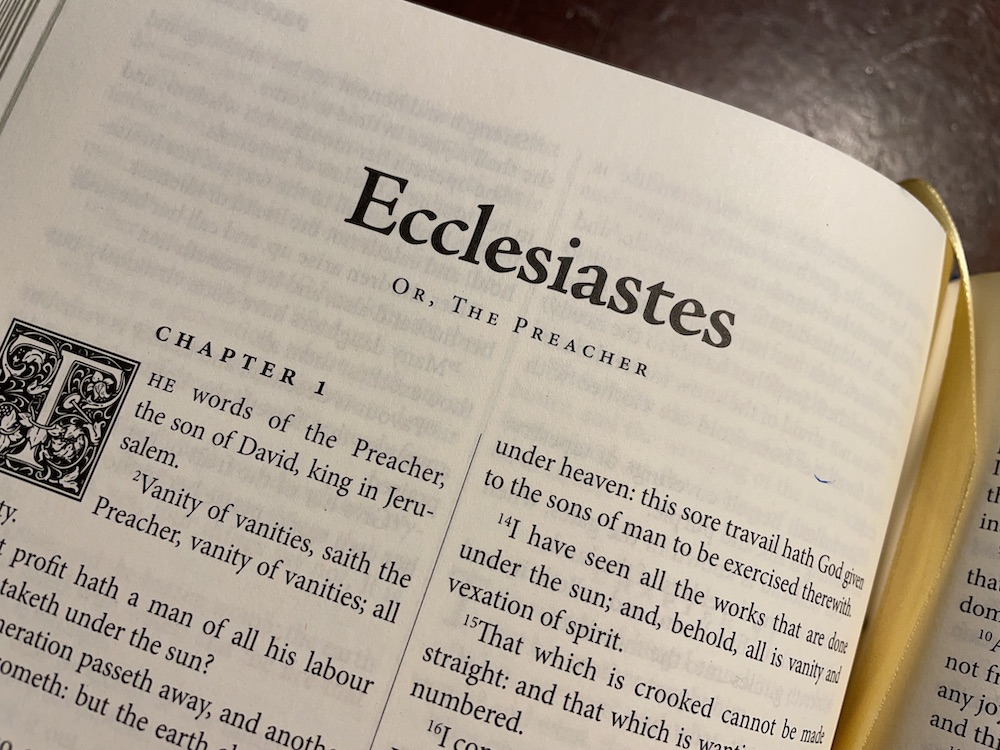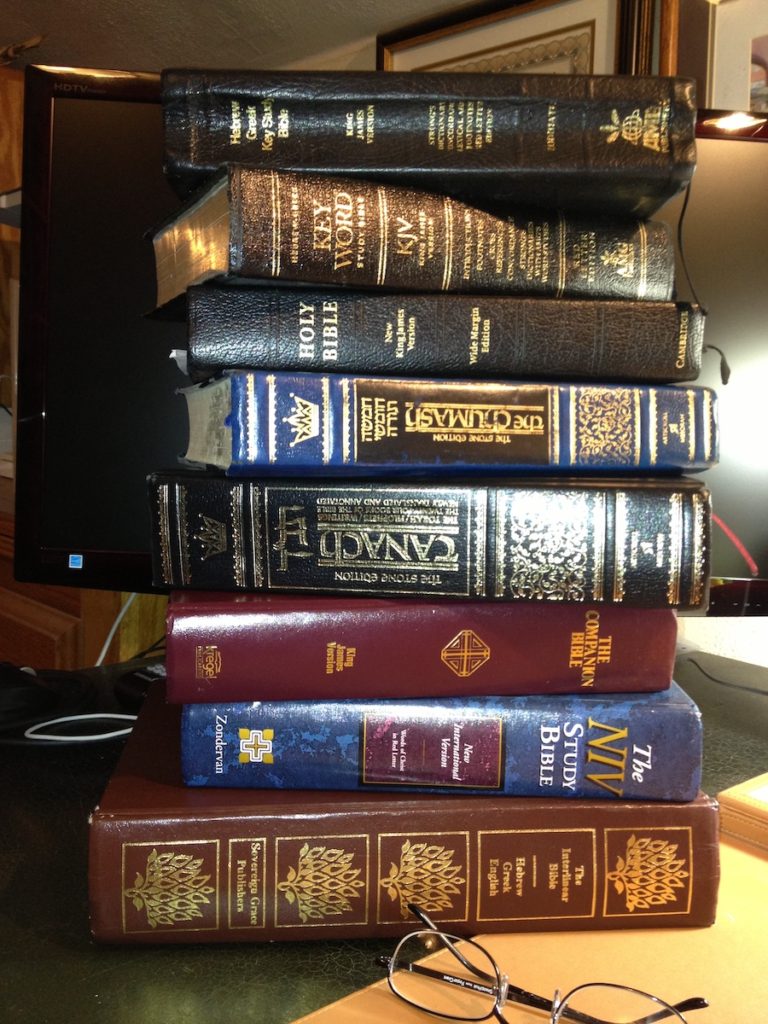
Ecclesiastes 5
Ecclesiastes 5:1, Walk prudently [keep thy foot, KJV]. Once again, the Preacher teases the reader by inserting another “God principle” into his monologue on the ultimate meaninglessness of life. It is as if he is toying with us by, on the one hand, repeatedly demonstrating to his reader the vanity of life, yet, on the other hand, giving his reader a glimpse into another reality, another dimension that is outside of this time-space continuum—this prison spaceship called life on earth. He is telling us in bits and pieces that there is a bigger picture, a better way, but one has to factor Elohim into the equation for that picture to come into view. As long as one does not, then there is no hope, purpose or meaning to life. If one does, however, then a whole new picture begins to emerge out of the obscurity of the dark fog of this physical existence.

So how does one walk prudently, or keep one’s foot, so that one does not stumble over the conundrums of trying to squeeze meaning out of one’s physical, seemingly pointless life?
Go to the house of Elohim. When we think of the “house of God” what immediately comes to mind? Probably the ancient temple of Elohim in Jerusalem. But that temple is long gone. So what is the house of Elohim now? A church? A cathedral? Some manmade chapel somewhere where one is surrounding by religious icons and an artist’s conception of God that somehow stirs the emotions of man into a state of worship and awe? Or is it something much deeper and simpler than that? What if one does not have a church building to go to? Then what? Is it impossible to find Elohim because some man or men somewhere have not constructed a physical building and placed a label on it called “a church”?
The fact is that if one digs deeply into the meaning and purpose of the biblical concept of “the house of Elohim” one will find that the Tabernacle of Moses and the Temple of Solomon were representations of the composite human being comprised of a physical body housing a soul (the mind, will and emotions) and a spirit (the deep, inner part of man that is immaterial and connects us to Elohim who is a Spirit). In the Testimony of Yeshua, we learn that the saint is now the temple of the Spirit of Elohim or “the house of God.” As the ancient Israelite temple was “the house of Elohim” on this earth housing the glory of Elohim’s presence within its inner most chamber (the holy of holies), even so the presence of Elohim now resides in the innermost part of man—his personal spirit.
Draw near to hear. So when the Preacher tells us to go into the house of Elohim and “to draw near to hear,” he is telling us to go carefully, prudently and not to rush in. Stop, quiet down one’s continuos roiling thoughts and emotions, and listen. Listen to the Spirit of Elohim speaking to us through our personal spirit.
Ecclesiastes 5:2, Do not be rash. Once again, the Preacher continues to give us more clues on how to find Elohim—how to escape the endless hamster wheel called life which ends in death, which is vanity or ultimately meaningless emptiness. Slow down! Think before you speak. Say less. Stay humble and small before Elohim. These are keys to finding Elohim. These instructions seem overly simplistic, yet how elusive they really are in this modern world—especially for those who live and work in urban settings.
Ecclesiastes 5:3, Dreams. Anyone can dream big ideas and con people into thinking that they are on track to achieving great things. In reality, many words and a multitude of dreamy ideas mean little or nothing.
Ecclesiastes 5:4–5, Do not make a vow. Elohim is not impressed by talkers; he wants doers. It is better not to open one’s mouth, to give one’s word and to make commitments, than to spout off grandiose promises and ideas that will never come to fruition.
Ecclesiastes 5:6–7, Do not let your mouth. The proper control and use of one’s mouth is a key to finding Elohim, for it is the mouth’s misuse that engenders much grief and conflict that makes this somewhat life on this earth even more difficult, stressful, full of conflict and ultimately meaningless. Moreover, as stated elsewhere, in the multitude of words there is no lack of sin, which only takes us further away from Elohim and our only escape from this wearisome and tedious physical existence. A foolish and godless person gives little thought to the words that come from his mouth, which only leads him little-by-little deeper into the pit of despair of this physical life.
Fear Elohim. The Preacher continues to give us clues in the form of a trail of delectable bread crumbs that will lead us upward and out of the vanity of vanities of this physical existence. In the Psalms and Proverbs we learn that the fear of Elohim is the beginning of both knowledge and wisdom. Fear is a safety mechanism that preserves life. The fear of death keeps one from stepping off a tall ledge or from ingesting a poisonous substance. Likewise, the fear of Elohim will keep us on the straight and narrow path morally and spiritually, so that we are less likely to sin and bring the miserable consequences thereof upon ourselves in this life and the next life.
Ecclesiastes 5:8–9, The oppression of the poor. Do not be overly worked up over the oppression of the poor and social injustice. , for these are part of the human condition. It always has been and always will be, and there is little or nothing one can do about it, so why stress yourself out over it and make your already vain life more meaningless? After all, it is to the advantage of government officials to address oppression and injustice , or else they will lose their lofty and lucrative positions of power from which they rule their people. Disgruntled people eventually rise up and overthrow their rulers.
Ecclesiastes 5:10–17, He who loves silver. In this section of his discourse, the Preacher continues to demonstrate the ultimated empty meaninglessness of making the acquisition of wealth and material possessions one’s chief goal. While such a person pursues riches, he is actually impoverishing himself in many ways. On the other hand, the one who humbly labors in his profession will sleep well at night, for he has worked hard and honestly and can feel good about it (v. 12).
Ecclesiastes 5:18–20, Here is what I have seen. At this point in his discourse, the Preacher gives a summary of what he has learned and preliminary conclusion to finding some measure of happiness in life without factoring in Elohim. Work hard and enjoy the fruits of your labor including good food and drink. These are gifts from Elohim to all humans to blunt the ultimately reality of the meaninglessness of this life. So rejoice in these things and be grateful. Even thought the Preacher does not spell this exactly, perhaps one can read between the lines and surmise that a few thoughtful and grateful individuals will stop for a moment form their labors, and in gratitude look upward to heaven and discover Elohim. In so doing, they have taken a first step to finding an escape from the endless and seemingly pointless cycles of life on this earth.
Ecclesiastes 6
Ecclesiastes 6:1–12, More hopeless despair over the seeming pointlessness of life. The next twelve verses are a continuation of the main theme of Ecclesiastes: the pointlessness of life without Elohim.
Ecclesiastes 6:9, Better is the sight of the eyes. One in the hand is worth two in the bush. Enjoy and be thankful for what you have now instead of always wanting more and never being satisfied.








